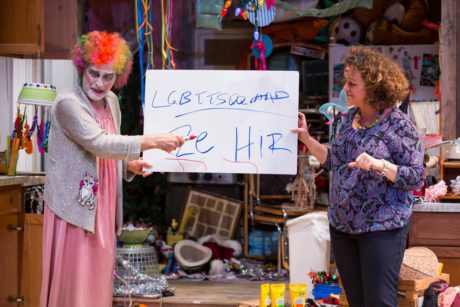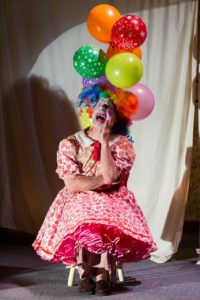I recently came back from London, where I saw the National Theatre’s 25th anniversary production of Tony Kushner’s epic, Angels in America. I thought a lot about that play after seeing Woolly Mammoth Theatre Company’s production of Taylor Mac’s brilliant (a word I rarely use) Hir (pronounced “here”). Both plays deal with crumbling belief systems, and the new ones that rise up in their place. But if Angels shows us the hope of such an endeavor, Hir shows us the folly. Where Kushner uses the entire universe as his canvas, Mac works on a smaller, but no less powerful scale, using a single family, in an ugly living room in a suburban wasteland somewhere in California.

Son, Isaac (Joseph J. Parks), has been dishonorably discharged from the military and returns home from what his mother, Paige (Emily Townley), simply refers to as “the war” (does it matter which one, as long as it’s “over there” and not “here”?). But things have changed since Isaac has been away, and while he may have left a literal war, he finds battles raging on a much closer front where he must choose to be ally or enemy.
His family and home are in total chaos. His father, Arnold (Mitch Hébert), has become incapacitated by a stroke and Paige, in retaliation for years of emotional and physical abuse, has made her husband’s life one daily humiliation after another: she lets him sit in soiled diapers, forces him to sleep in a cardboard box, and makes him drink yogurt smoothies stuffed with estrogen pills. Although when he left, he had a sister, Isaac now has a brother, Max (Malic White), a transgender anarchist. And Paige, who has assumed leadership of this new order, is reveling in new found freedom and enlightenment. She announces, “We don’t do laundry anymore. We don’t do places, cupboards and order anymore.”
At its core, Hir is about a power struggle. Not about gender, but about ideologies, about what we believe and the manner in which we live. There are huge stakes for these characters, as their entire lives hang in the balance. And Director Shana Cooper, doing excellent work here, stages it on Misha Kachman’s extraordinary set, a mess of sparkling lights and detritus, glitter and garbage in an unfinished home with exposed insulation and beams, lacking a solid foundation and representing both Arnold’s lack of aspiration and Paige’s focus on something larger than the material world. The intentionally harsh lighting is by Colin K. Bills and vivid costume design is by Ivania Stack.
While laughs abound in what is seemingly a house of lovable kooks, let’s be clear, Hir is a dark, dark play. In order to create something new or repair something old, it follows that something must be broken. So, Paige and Isaac, who are broken themselves, break and break and break in an attempt to reach their own objectives. Max and Arnold become pawns. And casualties. For Isaac, the family must be maintained; it must be made whole again. But in the quest for the new world order Paige imagines, no one is spared, not even family. And everyone, even victims, are capable of unimaginable cruelty. Attempts to retreat and flee are futile. As Isaac says towards the end of the play, “you can’t leave places.” Yes, they remain deep inside and you carry them through life, like a shadow that holds every memory and secret.
As Isaac, Joseph J. Parks embodies what we can only imagine are some of the worst qualities Arnold possessed before his stroke. He is an old soul in a young virile body, unprepared for and incapable of existing in a world that spun forward without him.

As his father, Mitch Hébert, is a shell of his former self and he becomes less sympathetic the more we learn about the man he was. Through Max, Paige is able to shape the child she has wanted, a willing, non-threatening foot soldier. But Malic White’s sensitive performance reminds us that Max is still a kid, desperate for male acceptance and a role model. .
Hir rises and falls on the actress playing Paige and Emily Townley dives head first into the role. Paige is quirky and strange, but she’s also ruthless and hard. While Ms. Townley expertly conveys the former, I didn’t find that she quite showed us Paige’s darker shades, at least until the last minutes of the show where she becomes as unlikable as she says strangers perceive her to be.
Paige speaks frequently about paradigm shifts, how her perspectives and assumptions about things keep changing. In Hir, Mac takes the traditional living room drama and upends it, challenging not only what we know about theatrical form and convention, but what we believe about the world we live in and about those we are closest to.
Hir is not just a very funny play, but a very important one, showing us lives that are so different and strange, but also more familiar than we may care to admit.
Running Time: Two hours, with one intermission.
Hir plays through June 18, 2017, at Woolly Mammoth Theatre Company – 641 D Street NW, in Washington, DC. For tickets, call (202) 393-3939, or purchase them online.





